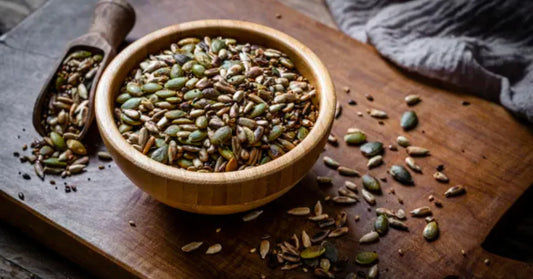Which Dry Fruits Are Known to Improve Lung Health in Polluted Environments?
Almonds, walnuts, dried figs, apricots, and raisins are known to improve lung health in polluted environments.
Detailed Answer:
1. Almonds: Rich in vitamin E and antioxidants that protect lung tissue.
2. Walnuts: Contain omega-3 fatty acids that reduce inflammation.
3. Dried figs: High in fiber and antioxidants that improve lung function.
4. Apricots: Packed with vitamins A and C, supporting respiratory health.
5. Raisins: Provide antioxidants and anti-inflammatory properties.
In polluted environments, certain dry fruits can play a significant role in improving lung health. Almonds are rich in vitamin E and antioxidants that protect lung tissue from oxidative stress and damage. Walnuts contain omega-3 fatty acids, known for their anti-inflammatory properties, which help reduce inflammation in the respiratory system.
Dried figs are high in fiber and antioxidants that improve lung function and overall respiratory health. Apricots, packed with vitamins A and C, support respiratory health by enhancing immune function and reducing oxidative stress. Raisins provide antioxidants and have anti-inflammatory properties that protect the lungs from pollution-related damage. Including these dry fruits in your diet can help maintain healthy lung function in polluted environments.
How Do the Antioxidants in Dry Fruits Help in Protecting the Lungs from Pollution?
Antioxidants in dry fruits protect the lungs by neutralizing free radicals and reducing oxidative stress caused by pollution.
Detailed Answer:
1. Neutralize harmful free radicals.
2. Reduce oxidative stress in lung tissue.
3. Protect cells from damage caused by pollutants.
4. Enhance immune response to respiratory infections.
5. Promote overall respiratory health.
Antioxidants in dry fruits play a crucial role in protecting the lungs from the harmful effects of pollution. They neutralize free radicals, which are unstable molecules that can cause significant damage to lung tissue. By reducing oxidative stress, antioxidants help prevent cellular damage and inflammation in the respiratory system.
Additionally, antioxidants enhance the immune response to respiratory infections, making the lungs more resilient against pollutants. They promote overall respiratory health by maintaining the integrity of lung cells and tissues. Consuming antioxidant-rich dry fruits, such as almonds, walnuts, and apricots, can help safeguard your lungs in a polluted world.
Can Consuming Dry Fruits Regularly Reduce the Risk of Respiratory Diseases Caused by Pollution?
Yes, consuming dry fruits regularly can reduce the risk of respiratory diseases caused by pollution by providing essential nutrients and antioxidants.
Detailed Answer:
1. Strengthen the immune system.
2. Reduce inflammation in the respiratory tract.
3. Improve lung function and capacity.
4. Protect against oxidative damage.
5. Support overall respiratory health.
Regular consumption of dry fruits can significantly reduce the risk of respiratory diseases caused by pollution. The essential nutrients and antioxidants in dry fruits strengthen the immune system, making the body more resistant to infections and pollutants. They also reduce inflammation in the respiratory tract, which is a common response to pollution exposure.
Dry fruits improve lung function and capacity, enhancing the body's ability to filter out and expel harmful particles. By protecting against oxidative damage, these fruits help maintain healthy lung tissue and prevent the onset of chronic respiratory conditions. Including dry fruits in your diet is an effective way to support respiratory health in polluted environments.
What Specific Nutrients in Dry Fruits Support Lung Function and Detoxification?
Specific nutrients in dry fruits that support lung function and detoxification include vitamin E, omega-3 fatty acids, fiber, and antioxidants.
Detailed Answer:
| Dry Fruit | Key Nutrients | Benefits |
|---|---|---|
| Almonds | Vitamin E, Magnesium | Protect lung tissue, reduce inflammation |
| Walnuts | Omega-3 Fatty Acids | Reduce respiratory inflammation |
| Dried Figs | Fiber, Antioxidants | Improve lung function |
| Apricots | Vitamins A & C | Support respiratory health |
| Raisins | Antioxidants | Protect against oxidative damage |
Dry fruits contain specific nutrients that support lung function and detoxification. Vitamin E, found in almonds, protects lung tissue from oxidative damage and reduces inflammation. Omega-3 fatty acids in walnuts have powerful anti-inflammatory properties that reduce respiratory inflammation and support overall lung health.
Fiber and antioxidants in dried figs improve lung function by enhancing the body's ability to filter and expel pollutants. Apricots, rich in vitamins A and C, support respiratory health by boosting the immune system and reducing oxidative stress. Raisins provide antioxidants that protect the lungs from damage caused by pollution. Including these nutrient-rich dry fruits in your diet can help maintain healthy lung function and support detoxification.
Are There Any Recommended Dry Fruit Combinations for Maximum Lung Protection in a Polluted World?
Combining almonds, walnuts, dried figs, apricots, and raisins can provide maximum lung protection in a polluted world.
Detailed Answer:
1. Almonds and walnuts: Boost antioxidant levels and reduce inflammation.
2. Dried figs and apricots: Improve lung function and support respiratory health.
3. Raisins and almonds: Provide a quick energy boost and protect against oxidative damage.
4. Walnuts and apricots: Enhance immune function and reduce respiratory infections.
5. Mixed dry fruit snack: Combine all for a nutrient-dense snack.
For maximum lung protection in a polluted world, combining different dry fruits can provide a synergistic effect. Almonds and walnuts together boost antioxidant levels and reduce inflammation, protecting lung tissue from damage. Dried figs and apricots improve lung function and support respiratory health with their high fiber and vitamin content.
Raisins and almonds provide a quick energy boost while protecting against oxidative damage. Walnuts and apricots enhance immune function and reduce the risk of respiratory infections. Creating a mixed dry fruit snack that includes all these dry fruits ensures a nutrient-dense and delicious way to support lung health. Regularly consuming this combination can help protect your lungs from the harmful effects of pollution.
Conclusion
In a polluted world, protecting your lungs is crucial. Including dry fruits like almonds, walnuts, dried figs, apricots, and raisins in your diet can provide essential nutrients and antioxidants that support lung health and reduce the risk of respiratory diseases.
Embrace the power of these nutrient-dense foods to maintain healthy lungs and overall well-being.

















